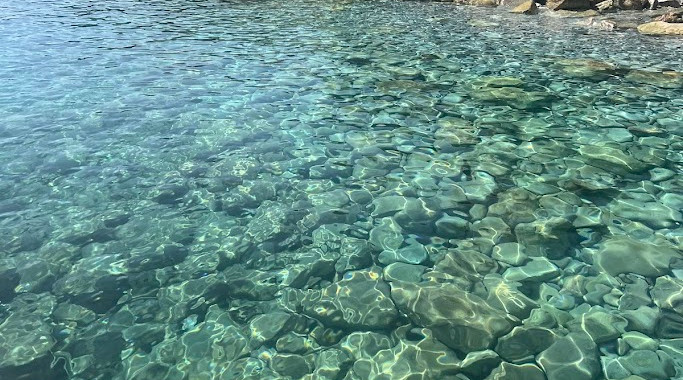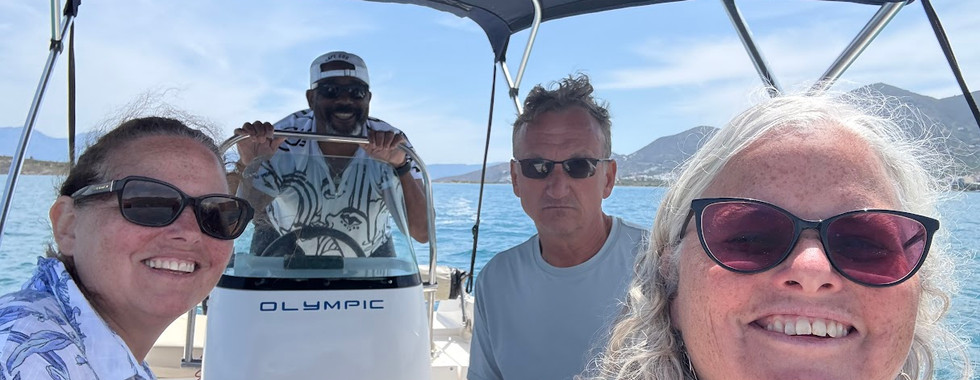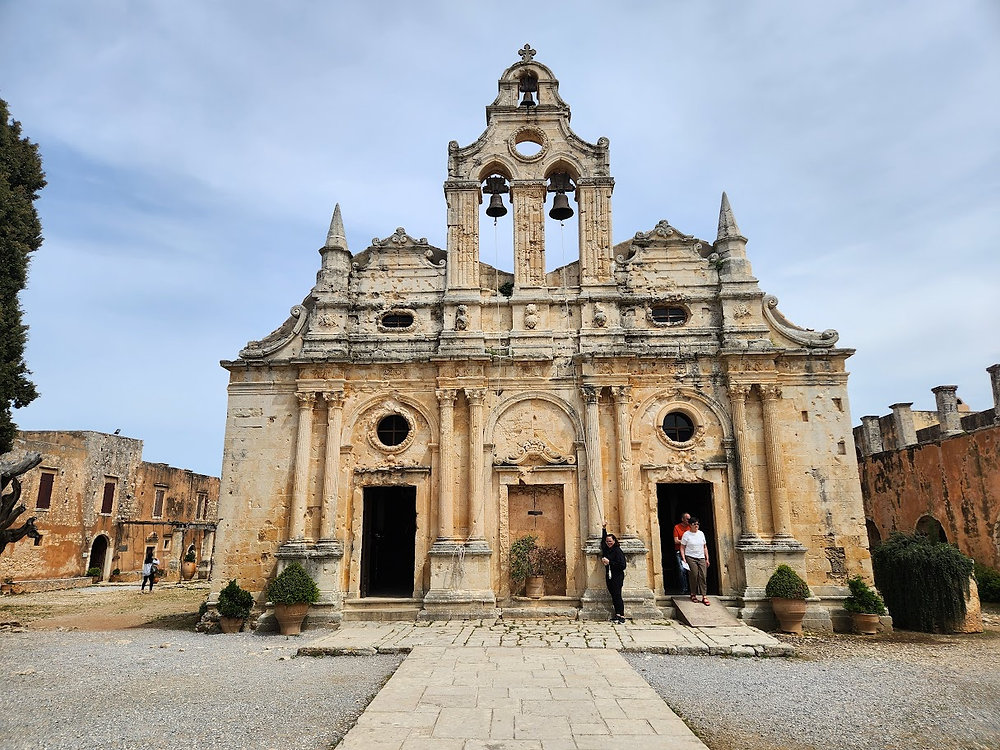
"Sunsets, Souvlaki, and Sh*t Cans: Tales from Crete"
May 1, 2025
13 min read
3
27
0
Leaving Amsterdam is never easy — especially when you’re stuffed with stroopwafels and questionable life advice from guys on bicycles — but adventure doesn’t wait. And sometimes, when you’re feeling spontaneous (and frugal), you board Transavia Airlines, home of the sparkling new, clean planes… and the brightest green, non-reclining seats known to man.

Now, these seats weren't broken — they were designed that way, as if the airline decided passengers would simply be too excited to recline. And honestly, after being greeted by the friendliest, most cheerful flight attendants in the skies, it was hard to complain. It felt like flying in a happy, rigidly upright garden.
After a smooth 3.5-hour flight, we landed at Heraklion International Airport (HER), which looked like it had once been a thriving hub but had since decided to embrace retirement. The terminal walls were tired, the baggage belts moved like they needed a nap, and as we stepped outside, it didn't get much better. A sea of rental car companies circled us, each with fraying flags flapping wildly in the breeze, like desperate suitors at a medieval market.
Luckily, we were saved from that chaos. My wife’s sister and brother-in-law, who had been living their best island life in Crete for nearly a month, scooped us up in their trusty five-speed mini SUV: an Opel. Yes, an Opel. I hadn’t seen an Opel since kids actually went outside to play without being tracked by an app.
The plan was simple: drive about an hour and a half to our Airbnb and officially start vacation mode. But as it often goes when you land hungry, caffeine-deprived, and slightly delirious, plans changed.

About thirty minutes into the drive, the collective need for coffee and "necessities" (translation: snacks, coffee, and maybe wine) became undeniable. We stumbled across a local market, grabbed some essentials, and were back on the road — only to make another important pit stop at a little roadside hut selling fresh oranges.
And that’s where everything changed.
It was here that my wife met her new best friend: Mary.
Now, "Mary" wasn’t a local vendor, a charming Greek grandmother, or a wayward tourist. Mary was a donkey. A sweet, slightly scruffy, impossibly soulful donkey, standing

proudly next to the orange stand like she was the mayor of the whole operation. From the moment they met, my wife was smitten. Mary leaned her fuzzy head against her, with a blissful look that said, "Yes, human, scratch behind my ears forever and I shall love you till the sun stops shining."
From the look on Mary’s face, she had found true happiness — and so had my wife.
With a bag of fresh oranges, caffeine flowing, and a few dozen donkey selfies captured, we finally set off again — bumping along in the Opel with the sun shining and our hearts lighter.
Our first big stop was Matala, a legendary village famous for its dramatic cliffs, crystal waters, and the caves that once housed Roman tombs — and, much later, a colony of free-spirited hippies in the 1960s (Joni Mitchell, Bob Dylan, Joan Baez, Janis Joplin and Cat Stevens). After a lunch perched on a cliffside overlooking the sea (with about fifteen semi-professional cat beggars circling our table), we were officially charmed. One cheeky cat even gave my wife’s backside a motivational tap to share her fish, while another boldly jumped into her lap like he had made a dinner reservation.
Post-meal, we climbed through the ancient caves, feeling a little like modern-day explorers and a little like we were about to start a very niche rock band. The caves still echoed the spirit of the hippies who had once made them home — a mix of freedom, resilience, and probably questionable hygiene practices.
Eventually, dusty, happy, and still laughing about Mary the roadside donkey and the Great Cat Uprising of Matala, we squeezed back into the Opel and headed for our Airbnb — officially embracing the idea that sometimes, the best adventures are the ones you never planned.
Our Airbnb was perched on the north coast of Crete, in a charming little town called Rethymno—which, fun fact, translates loosely to “your calves are not ready.” The place was a three-tiered palace built into the side of a hill that, to anyone with knees over the age of 40, might as well have been Everest. Climbing the three flights of stairs to the top felt like competing in a triathlon with no training, no medal, and no defibrillator at the summit.
Now, unless you're fluent in five-speed manual transmissions and Greek parking logic (which is more of a suggestion than a science), getting the car into the designated spot was like playing a high-stakes game of Tetris… in a moving vehicle… blindfolded. The in-laws, being practical and slightly younger in the knee department, parked at the bottom and hoofed it up like it was a spiritual pilgrimage. Show-offs.
But oh, sweet baby Zeus, once you reached the top—the penthouse unveiled itself with a jaw-dropping ocean view and enough space to swing a Spartan spear. The host had left us a welcome spread: a bottle of wine, a basket of fruit, and enough coffee pods to fuel a small office for two days. Classy touch. I like to believe my in-laws chose this particular Airbnb for its proximity to a local monastery… but let’s be real—it was probably the view and the Wi-Fi.
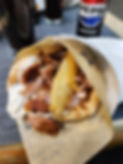
Once we caught our breath and stopped pretending we weren’t about to pass out, our stomachs began roaring louder than a Cretan goat with a sore throat. Time to eat. We strolled (read: limped) down Arkadi Drive along the coast and landed at Petrino Grill House, where I had what can only be described as the Zeus of all gyros. Piping hot, packed with meat, fries in the gyro (what genius!), and a drink—all for a soul-shaking three euros. I went into fiscal shock. HOW are they making a profit? Is this place run by philanthropic gods?
As if that wasn’t enough, the lovely waitress came out and handed us a round of post-meal shots called Raki—a local firewater that's basically Crete’s answer to “cheers” and “hello,” and possibly “let’s dance on the table.” It’s a symbol of friendship, hospitality, and your evening getting a little fuzzy around the edges. One sip and I felt like a true Cretan warrior.

But ah, with every Greek tragedy comes a twist: the bathroom situation. Here's the plot twist nobody sees coming—you can't flush toilet paper. That’s right. The plumbing is old-school, with pipes as narrow as your patience after a long flight, so you’re instructed to toss the used tissue in the bin. Yep, the ol’ poop basket. A “shit can,” if you will. Thankfully, some places have bidets, and let me tell you, that little fountain of cleanliness becomes your best friend real fast. It's like a spa treatment… for your dignity.
We woke up the next morning ready to conquer the charming city of Rethymno. The in-laws had cooked up a plan to meet one of Greece’s last remaining phyllo pastry wizards—a true dough-slinging legend. But first, breakfast like gods.
We hand-squeezed some oranges we scored from Mary’s donkey stand (yes, a real donkey stand—only in Crete), boiled some fresh eggs, and laid out crusty bread from the local bakery. Then we sliced up some smoked Gouda we smuggled in from Amsterdam like the cheese-loving rebels we are. The whole spread was devoured on the balcony with the ocean winking at us like, “You fancy now.”
Fueled by dairy and ambition, we headed into town and parked near the old Venetian harbor. The scene looked like it was ripped straight from a postcard—fishing boats bobbing in the water, tavernas lining the shore, and the Rethymno Lighthouse standing tall since the 1830s like, “I’ve seen some things.” Looming to the west, the Fortezza citadel kept watch from its hilltop perch, a 16th-century beast shaped like a star and built like a fortress should be—stubborn and slightly dramatic.
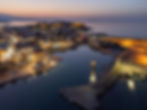
Then came the journey for phyllo glory.
We hit the cobblestone streets on foot, weaving through narrow alleyways like confused pirates, half-lost but fully determined to find the pastry shop. The town was waking up, stretching its limbs after a sleepy winter, prepping itself for the stampede of tourists about to descend.
Thirty minutes and a few wrong turns later—EUREKA—we found it! My sister-in-law, possessed by the spirit of Greek hospitality (and a little bit of Netflix tourism), turned to her right, looked at an older woman, and with pure conviction said, “Yaya!”
Now, here’s the thing about my sister-in-law: wherever she goes, she becomes a local. Accent, mannerisms, probably has dual citizenship by now. “Yaya,” by the way, means grandma—or any wise and wonderful older woman who could likely out-cook your entire family.
Inside the shop, two men—likely fueled by tradition, muscle memory, and ancient flour dust—were stretching phyllo dough to the literal four corners of massive tables. I’m talking Olympic-level dough gymnastics. Sadly, the original master, Yaya’s husband, had passed, but his son and grandson now carry the flaky torch, hand-making phyllo like it’s a sacred art (because it is).
As we left, Yaya handed us some baklava that could cause tears of joy in the emotionally stable. Sticky, nutty, honey-drenched slices of heaven that demanded respect. And a second helping.
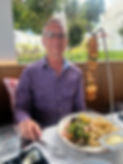
We waddled back toward the car, along the harbor, where we were immediately greeted—ambushed, really—by a chorus of friendly restaurant staff trying to lure us in with their menus and irresistible charm. My brother-in-law, in a moment of pure brilliance, dubbed them the “Souvlaki Slingers.” Took me a second, but then it clicked: souvlaki—those magical Greek meat skewers, a national treasure and official street food of the gods. Rethymno had us—body, heart, and full belly.
It was our final day at the Airbnb before we hit the road to Elounda in Agios Nikolaos, but before we could bid farewell to Rethymno, there was one last stop on the bucket list—my namesake monastery. Yep, it was time for a pilgrimage to Arkadi Monastery, a place so epic it shares a name with yours truly. Coincidence? I think not.
Now, it was only 15 miles away, but in true monastery fashion, it wasn’t content to be conveniently located. No, this place had to be dramatically perched on a plateau like a brooding hero in a Greek epic, surveying the land below and daring you to climb up for a visit. And so we did, climbing switchbacks and muttering to ourselves, “Of course it’s on a mountain. Of course.”
Founded in the 11th century, the Arkadi Monastery isn’t just another pretty old building. This place is legendary. It was once a hub of science and art, home to a prestigious school and a library that would make any book nerd swoon. But that’s not what earned it a permanent place in history.

No, Arkadi is a symbol of Cretan resistance—a fortress of defiance. During the 1866 Cretan Revolution against Ottoman rule, 943 Greeks—mostly women and children—sought shelter within its thick, high walls. And when the Ottomans came knocking with cannons and bad intentions, the monastery didn’t just hold its ground—it went out with a literal bang. Rather than surrender, the abbot ordered the ignition of barrels of gunpowder, sacrificing themselves in a fiery blaze of freedom.
That explosion didn’t end the rebellion, but it lit a fire around the world, drawing global attention to the Cretan struggle. Today, November 8th is celebrated with commemorations in both Arkadi and Rethymno. This place isn’t just sacred—it’s heroic.
Oh, and in case that wasn’t enough cred, the Arkadi Monastery is now proudly listed as a UNESCO Heritage Global Geopark, because even the universe had to tip its hat.
So yeah, not a bad way to wrap up our Rethymno chapter—standing in the shadows of history, on a mountaintop, with wind in our hair and pride in our hearts. Next stop: Elounda. But Arkadi? You’ll always have a piece of me.
The next morning, we gave our trusty Airbnb a farewell scrub, loaded up our little Opel SUV (which by now had earned a name and a personality), and hit the road bound for Elounda. With our days in Crete winding down, we had a tough decision to make for our grand finale: do we head to Spinalonga Island, the infamous former leper colony, or dive headfirst into myth and ruins at the Labyrinth of Knossos, legendary lair of the Minotaur?
Now, let’s pause for dramatic effect.
The Labyrinth of Knossos—an architectural fever dream of twisting stone corridors, hidden chambers, and enough dead ends to frustrate even Google Maps. Designed by the genius Daedalus, who barely escaped the thing himself, the labyrinth is said to have housed the Minotaur: half-man, half-bull, all nightmare. The stuff of legends, curses, and every Greek mythology book you skimmed in school.
But alas, we now live in the proud cradle of democracy, so we put it to a vote. The ballots were cast, the family council convened, and in a nail-biting 3-to-1 decision (my lone voice echoing in defeat), the winner was Spinalonga Island. The logic? Well, our resort was basically throwing shade at the island—it was that close.
So while my heart mourned the missed opportunity to explore ancient myth and possibly get lost in a Minotaur-infested maze, my practical side admitted... yeah, a five-minute boat ride and a relaxing afternoon did sound kind of nice.
Besides, who’s to say Spinalonga doesn’t have its own ghosts and legends? Just maybe fewer horns.
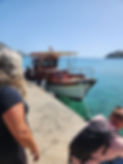
We rolled up to the dock to catch the ferry to Spinalonga Island, and honestly, the day couldn’t have been more perfect if Poseidon himself had planned it. The sun was out, the sky was bragging in full blue, and the water was so clear it looked like the ferry might just float on glass. The ride? A breezy five-minute hop—basically a glorified boat selfie session.
From the dock, you could already see Spinalonga’s Venetian fortress walls, jutting out like stone guardians. Depending on how dramatic you feel, they were either built to keep the Ottomans out… or the lepers in. Probably both.
Still salty about losing the vote to come here instead of facing down the legendary Minotaur at Knossos, I couldn’t resist one final jab as we boarded the boat: "I hope everyone’s immune system is in top form. If anyone loses a toe, I’m leaving you behind and telling customs it was a group decision.”
After we docked, we found a cozy, shady spot and had ourselves a quick picnic—sandwiches, snacks, and just enough smug silence from the people who didn’t want to battle mythical beasts that day. Honestly, it was peaceful. Relaxing, even.
But the moment we stepped into the island proper, the tone shifted.

Spinalonga is heavy with history. Once you passed through those fortress gates as a leper, you weren’t just walking into isolation—you were saying goodbye to the outside world. This place wasn’t just a quarantine zone; it was exile in stone.
And yet, in true human spirit, they made a life here. They built homes, a community, some sense of normalcy—flourishing as much as possible until medicine caught up and cracked the code.
We explored the island’s winding paths, its silent ruins whispering stories of resilience and sorrow. It was humbling… haunting… human.
The only thing we didn’t find?
A Minotaur. But I guess you can’t win every vote.
After wrapping up our historical stroll through Spinalonga, we hopped back on the ferry and cruised across the sparkling sea to the mainland, landing in Elounda just in time to do a little good old-fashioned tourist-ing. We wandered through the streets near the boat dock, dodging souvenir shops and soaking up the vibe—until we were stopped dead in our tracks by a King Kong-sized chocolate ice cream cone. And let me tell you, this thing was less “dessert” and more “architectural feat.” Naturally, we accepted the challenge.
Sugar buzz activated, we jumped in the car and drove a quick five minutes to what was allegedly our next home away from home: a resort advertised at just 100 Euros a night. Now, let me paint you the picture—two infinity pools, umbrellas and loungers galore, a poolside bar with staff ready to cater to your every whim, breakfast included, and—wait for it—a jacuzzi on every balcony. For 100 Euros. Yeah. My skepticism was fully engaged.
We pulled up to the security gate, half expecting someone to say, “Sorry, this is just the parking lot for the actual resort.” But no—out comes a sharply dressed security guard, clipboard in hand, asking our names, jotting down license plate info like we were VIPs. Moments later, a golf cart swooped in behind us, and a young man whisked away our bags like we were starring in a commercial for Greek luxury.
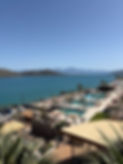
At check-in, five identically dressed, impossibly pleasant women greeted us with smiles, a welcome drink, and a quick rundown of the facilities. I was bracing for a bait-and-switch—but to my utter disbelief, the place was even better than advertised. Pristine. Polished. Possibly brand-new. I’m not saying we were the first guests, but the sheets still had that “just unfolded” crispness.
Everyone scattered to their rooms faster than kids on the last day of school, changed into swimwear, and reconvened at one of the glorious infinity pools. Now, if I have to nitpick—and let’s face it, I do—it would be this:1. No elevator. If your knees know what mine know, this matters.2. The pool water was, let’s just say, refreshing. But with the sun warming up like it was training for summer, we all eased in eventually, pretending not to shiver.
After a long, lazy afternoon of poolside lounging, cocktails, and obligatory vacation selfies, my in-laws had a dinner suggestion. Not just any dinner—a "you-have-to-try-this-place" dinner... in another town.
So we dried off, threw on our best "we-travel-well" outfits, and saddled up our trusty little Opel chariot for one last culinary quest—this time to Gioma Meze in Agios Nikolaos.
When you hype up a restaurant like it’s the culinary second coming, you better show up with your apron on tight and your flavors firing on all cylinders. And Gioma Meze? Oh, it brought it. No false advertising here—just straight-up deliciousness.
The food? Next level. Every bite felt like a Greek god personally blessed my taste buds. The view? Outrageous. Perched above the twinkling town of Agios Nikolaos, we watched the sun dip below the horizon like it was performing just for us.
It wasn’t just dinner—it was a full-on sensory experience. Another gem added to the Black and White Travel Chronicles recommendation list.
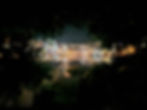
Major props to my sister-in-law. Great call, Sis—you nailed it.
The next morning, we woke up to what I can only describe as breakfast royalty, courtesy of the resort's spa kitchen. And no, this wasn’t your basic "continental breakfast" with sad croissants and a yogurt cup. We’re talking eggs made to order, crispy bacon, ham, fresh bread—the whole glorious breakfast parade. The kind that makes you cancel lunch before you even finish chewing.
With full bellies and zero responsibilities, we resumed our natural vacation state: horizontal by the pool. Life was good.
About 30 minutes later, my sister-in-law returned from a solo walk with that look—the one that screams “I have an idea, and it might be expensive or awesome—or both.”“Hey,” she said, casually, “want to rent a boat and cruise the coast?”
Cue unanimous yes.
Then the follow-up question: “Wait… who knows how to drive a boat?”
Someone threw out, “Hey Noah, didn’t you used to have a boat?”
So there we were—Noah at the helm, the rest of us assuming our roles as professional leisure enthusiasts.
We rented the boat for two hours, tracing the Cretan coastline, soaking in the salty breeze and postcard-worthy scenery. It felt like we had stumbled into one of those “Live Your Best Life” commercials—except this was real, and we weren’t actors. Just a bunch of people making memories that hopefully weren’t a once-in-a-lifetime kind of thing.
Then, without hesitation, my brother and sister-in-law jumped into the open sea like it was the most natural thing in the world. Honestly? It kind of was. An unforgettable day.
The next morning, it was time to part ways. My wife and I caught our flight to Paris, while my in-laws headed off to Milan, Italy.
But don’t worry—this blog isn’t over yet. We’ve got two and a half days in Paris coming up in the next chapter.

To all my followers and friends:
Raki—a local firewater that's basically Crete’s answer to “cheers” and “hello,” and possibly “let’s dance on the table.” It’s a symbol of friendship, hospitality, and your evening getting a little fuzzy around the edges.
Stay tuned—this baguette-fueled adventure is just getting started. 🥖✈️🇫🇷

















































